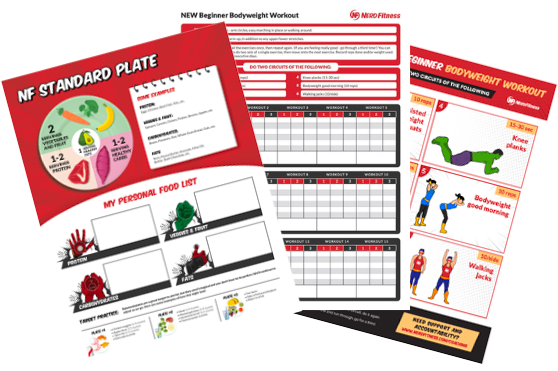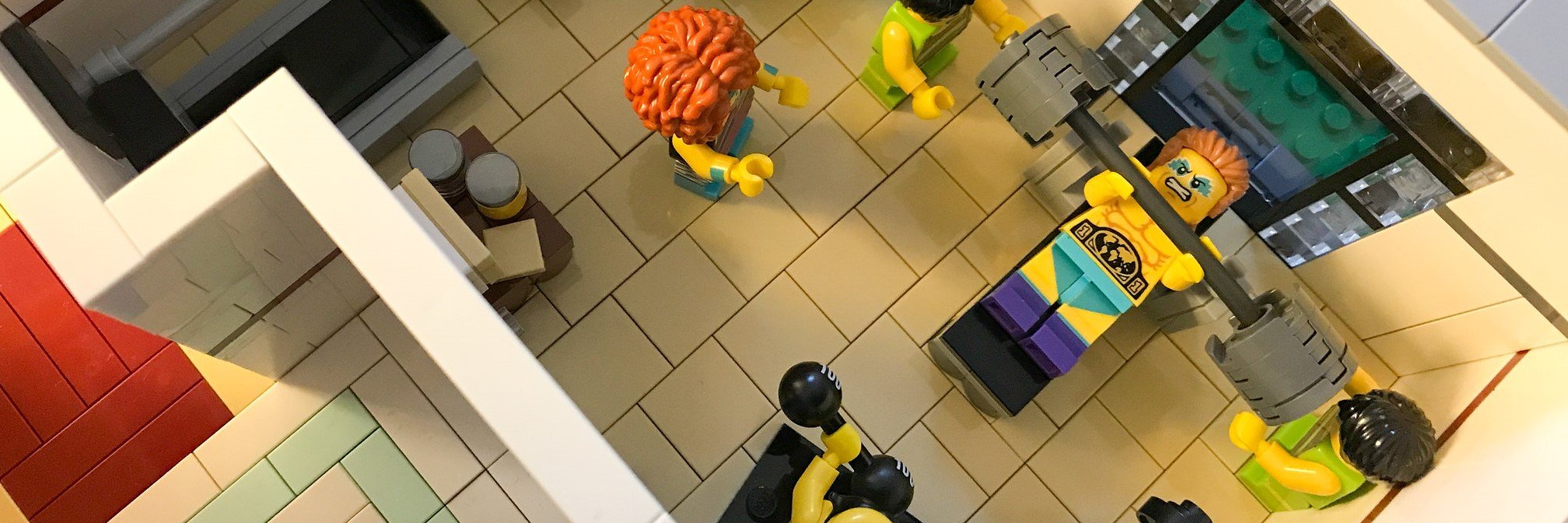
So you’ve decided to build a home gym? That’s great!
We’ve been helping people train from home for the past 12 years, and today we’ll share with you our top 16 ideas for building a gym in your garage (or apartment).
We’ve already covered how to stay in shape while staying inside, so today we’re tackling how to create your own home-gym space!
Oh, and if you’re wondering what to do with all this home gym equipment, we have guides that will show you step by step.
Here’s what we’ll cover in our guide, How to Build a Home Gym:
- Home Gym Level 1: Household Objects (Macgyver-style)
- Home Gym Level 2: A Pull-Up Bar, Kettlebell, and Yoga Mat
- Home Gym Level 3: Dumbbells and Gymnastic Rings
- Home Gym Level 4: Squat Racks, Benches, and Barbells
- Building a Home Gym Workout (Putting It All Together)
As you might be able to tell, we’re going to start with things you might have around your house. We’ll level up all the way to a legit home gym setup that you could charge a membership fee for.
Home Gym Level 1: Household Objects
As Coach Matt mentions in the video above, even if you’re without a single free weight in your house or apartment, all is not lost.
All sorts of household objects can be used for your home gym!
Imagine you’re like MacGyver – except instead of building a bomb out of Drain-o, a crazy straw, and bubble gum…
You’re building a home gym!
Here are some ideas for fitness equipment using everyday stuff:
#1) Jugs (Milk, Laundry)
If it has a handle and can store water, it can be used as a free weight.
In our Beginner Bodyweight Workout, I recommend using a milk jug for “dumbbell rows”:
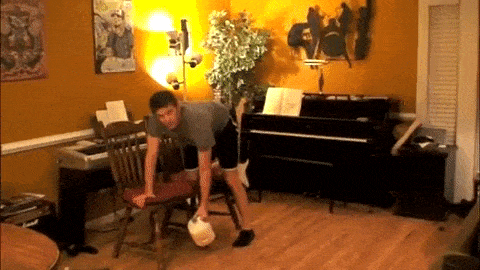
What if you’re only drinking oat milk or almond milk these days, and don’t have a milk jug?
No problem.
An empty bottle of laundry detergent, refilled with water, will fulfill the same purpose. To make it lighter, just fill it with less water.
Want to make it even heavier? Use sand instead of water.
Even heavier? Fill it with the weight of your feelings during quarantine.
#2) Buckets!
Do you know what’s specifically designed to hold water and be lifted and carried?
A bucket!
Duh. Though, I suppose I gave it away above.

A sturdy bucket can be a great tool for doing single-leg Romanian deadlifts, as demonstrated above by Coach Pat from our online coaching program.
Much like a jug, fill it with enough water (or sand) to match your strength level.
#3) Luggage.
At the time of writing this guide, most people aren’t really traveling anywhere due to COVID-19. This means your luggage and suitcases are probably just collecting dust.
So why not turn them into weights!
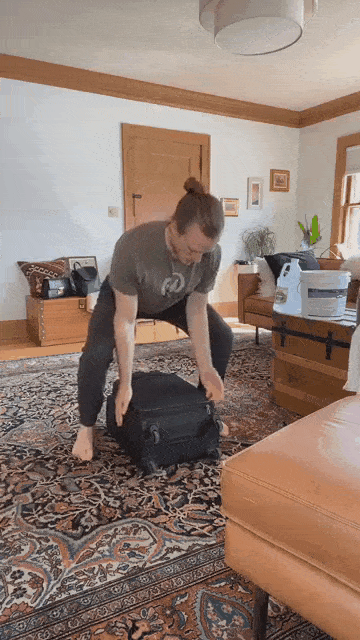
Just about any workout you can do with a sandbag, you could do with a suitcase full of weight.
What kind of weight, you ask? How about:
- Books
- Canned goods
- Rocks (put them in plastic bags first!)
Take a lap around your house, I bet you find a dozen things to increase the weight of your luggage.
In one of our home workouts found in Nerd Fitness Prime, Coach Pat got his luggage to weigh about 60 pounds using books and cans he had lying around his home.
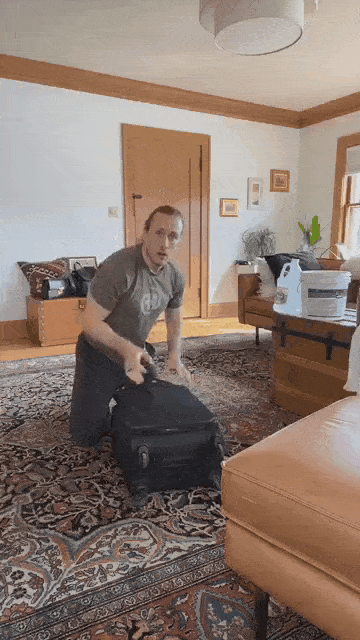
If it’s heavy and fits in your bag, it’ll work just fine.
#4) Towels
If you haven’t forgotten your towel, you’ll have yourself a versatile tool to use in your workouts.
Don’t believe me? Well, have you ever seen anyone use a towel for a deadlift?
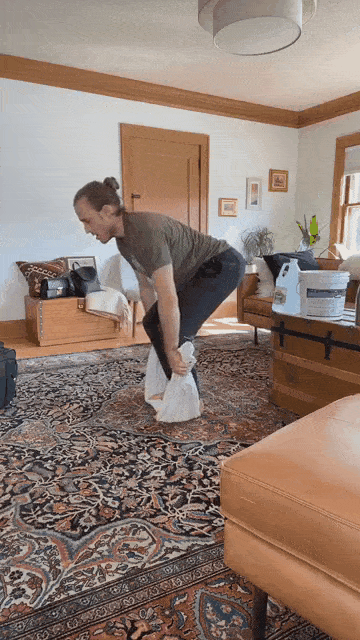
The trick is to get your setup right, by getting your hips back and chest out. Then you perform the same upward motion as you would in a normal deadlift.
I apologize if you rip your towel in half doing this because you’re so strong (but like, worth it).
Also, if you don’t have a pull-up bar (more on buying one next section), a couple of towels can help you do chin-ups off a sturdy door. Note – I said STURDY. Be careful!
Coach Jim shows you exactly how to do it right here:
#5) Doorways
Another way to train your “pull” muscles, without using a jug or bucket, would be to use a doorway!
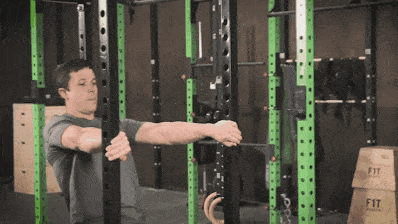
We can use the doorframe itself to support us, as we lean back and pull forward to complete the row.
Another option for performing rows would be…
#6) Tables
In our Beginner Bodyweight Workout referenced earlier, I show you how to perform inverted bodyweight rows using a dining room table:
Lie underneath your table so your head and shoulder are sticking out above it.
Grab the table edge with an overhand grip, and pull yourself up (just like it’s explained above).
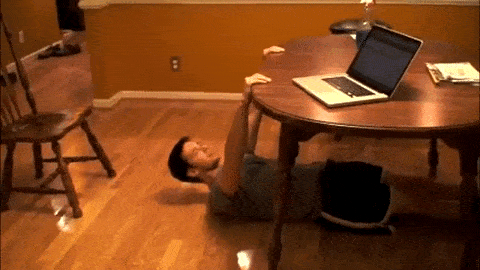
Home Gym Level 2: A Pull-Up Bar and Kettlebell
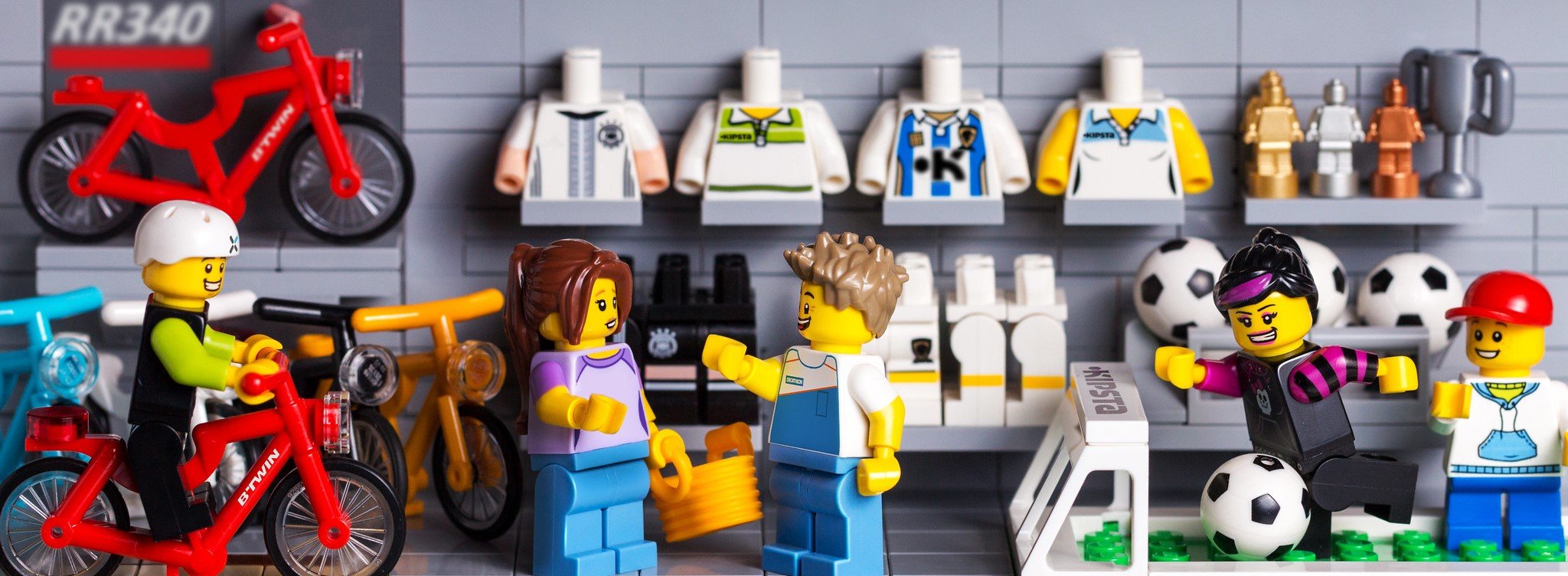
At this level, we are going to start actually making some purchases.
There are a few items that should you choose to buy, you’ll be able to perform a ton of different exercises.
#7) A Door Frame Pull-Up Bar[1]
With this one piece of equipment, you’ll have all you need to build a complete bodyweight workout.
Working your “pull” muscles can be tricky using just your bodyweight without access to a pull-up bar, so If you are going to buy a single piece of equipment for your home gym, start here.
If you’re serious about fitness, and you’re trying to get your first pull-up, a pull-up bar is a must.
#8) Doorway Fingerboard Climber
Want to level up your pull-up bar?
Consider a fingerboard climber or hangboard!
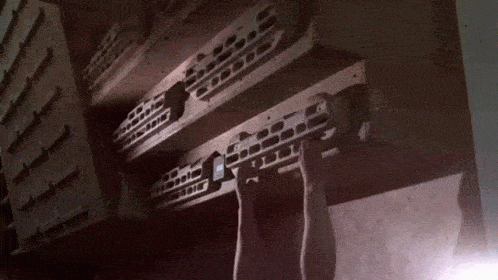
You’ll still train your pull muscles, plus you’ll get some amazing grip strength too in the process.
#9) A Kettlebell[2]
While you don’t need any equipment to grow strong (check out our guide for bodyweight exercises for proof), if you were going to buy anything, a kettlebell would offer you a lot of versatility.
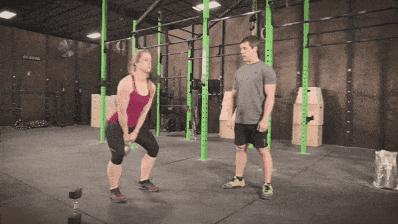
If you do end up picking one up, make sure you check out our 20-minute beginner kettlebell workout, which can be done with one single bell in your living room.
#10) Resistance Bands. Exercise bands don’t take up a lot of room and can be a great way to increase the difficulty of normal bodyweight moves.
For example, you could start doing band squats:
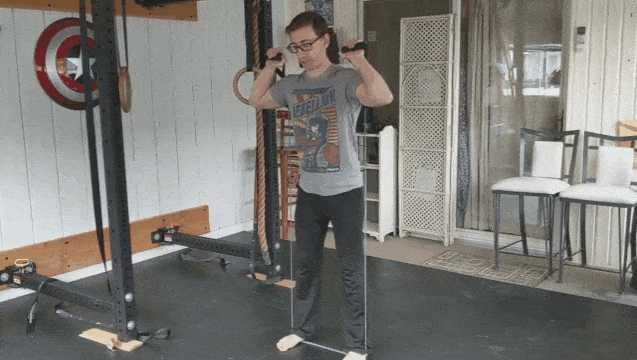
You have a few different options on bands to purchase, so check out our guide to exercise bands for tips on what to secure.
#11) Yoga Mat
If you have lots of comfy carpet or fluffy towels in your house, you don’t need a mat to do yoga.
But if you have hardwood floors or tile, you’re gonna want a mat to protect your knees and elbows.
(By the way, here’s a 20-minute yoga routine you can do at home)

Let’s give you three different options on what to buy:
- Manduka: I asked around our yoga channel in Nerd Fitness Prime, and Manduka mats were unanimously recommended as the best. The con is, they’re expensive. The Pro is, it’ll last you the rest of your life (they offer a lifetime warranty too).
- JadeYoga: more affordable, but also highly recommended from yogis in the Rebellion.
- A Towel: I was serious when I said a towel can help with all sorts of workouts.
Note: if you’re new to Yoga, check out NF Prime – we have a ton of Yoga videos designed for beginners who don’t do Yoga!
Home Gym Level 3: Dumbbells and Gymnastic Rings
At this point, we’re going to start equipping you with stuff that will make your garage/living room look like a gym.
Note: dumbbells. and rings are the ONLY pieces of equipment that Jimmy used to get in shape with our online coaching program:
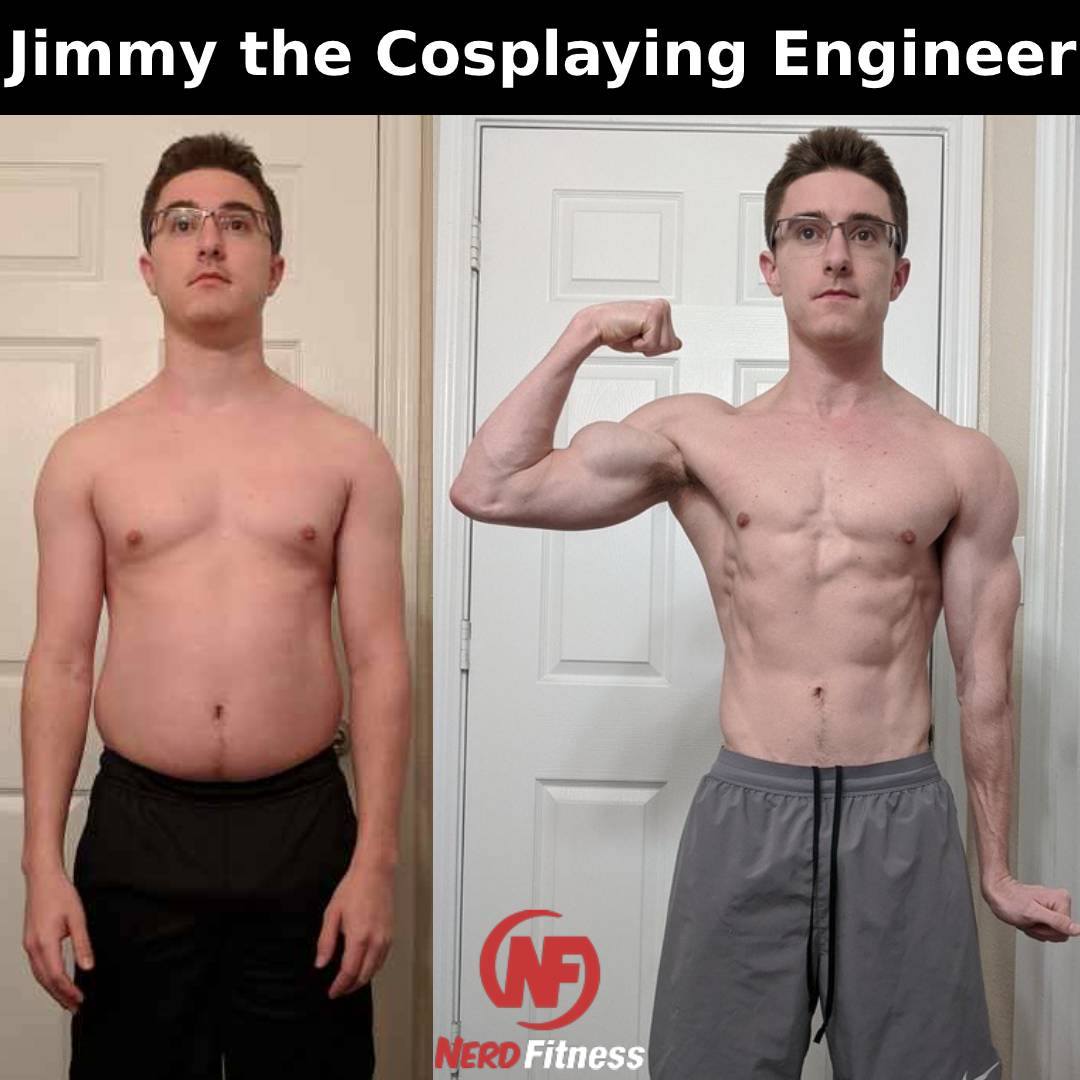
So you can get in shape with minimal equipment – it just comes down to having a great program to follow!
#12) Dumbbells
Dumbbells don’t take up a lot of space and offer you a great way to up the difficulty of your workout.
For example, instead of doing bodyweight squats, you can do goblet squats:
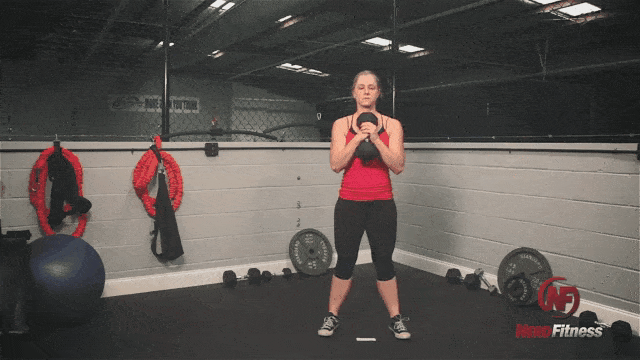
You can also use them for your chest press:
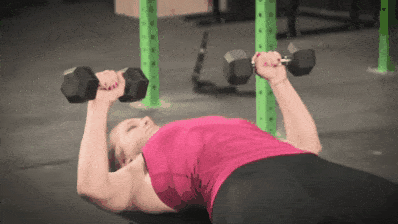
Or with a full-body movement like a snatch:
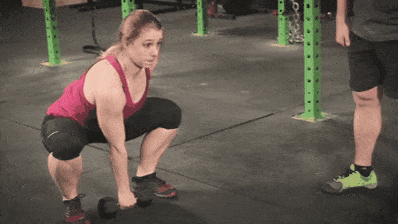
The cool thing about dumbbells is once a particular move gets easy, just grab a heavier dumbbell to increase the difficulty.
You have two options on how to handle progressive overload: either buy a bunch of different weighted dumbbells or get an adjustable set:
- Adjustable Dumbbells: On the one hand, these are expensive. On the other, you can adjust all the way up to a 50-pound dumbbell with one set. Pretty nifty.
- Dumbbell Set: You can also just buy individuals dumbbells and stack them in a corner.
#13) Gymnastic Rings
With a pair of gymnastic rings, you can do all kinds of awesome exercises.
Like chin-ups:
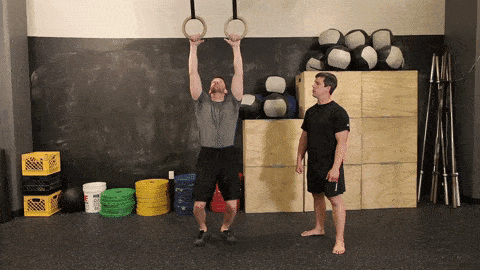
Or push-ups:
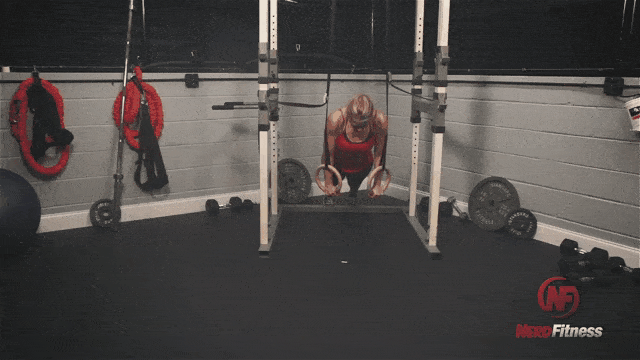
Or dips:
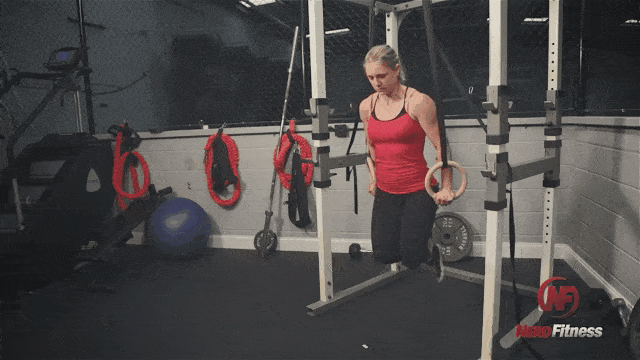
Or the big daddy of them all, the muscle-up:
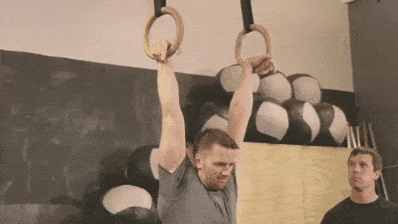
And lots of other stuff in between. Gymnastic rings are one of the most versatile pieces of equipment out there, which is why we LOVE them and have full resources to train with them.
Here are some things to consider when making your ring purchases:
- CHEAP AND EASY: If you’re not sure if rings are for you, but you’re ring-curious, I would consider starting with a set of wooden rings like these Peak Fitness Wooden Rings for less than $30. I guarantee the last thing you spent $30 won’t change your life the way these rings will.
- HIGHER QUALITY: My friend Peter runs FringeSport.com, and I can testify that his wooden rings are the highest quality rings I’ve ever used. If you KNOW you’re going to love rings and want to have a great pair that will last forever, go with these.
- FAST SET UP AND TAKE DOWN: These days, I use Rogue Competition Rings for one reason above all others. I have to set up and take down my rings each time I train, and the carabiners and segmented straps make for a quick set up and takedown.
- SMALLER HANDS?: Look for rings that are in “FIG” size. These International Gymnastics Federation rings are a bit smaller and thinner, which allows for better control for smaller hands.
If you’re interested in becoming the lord of rings, make sure you read our full guide on using gymnastic rings. It’ll walk you through how to set them up, exercises to perform, and building a full ring workout.
Home Gym Level 4: Squat Racks, Barbells, and Benches
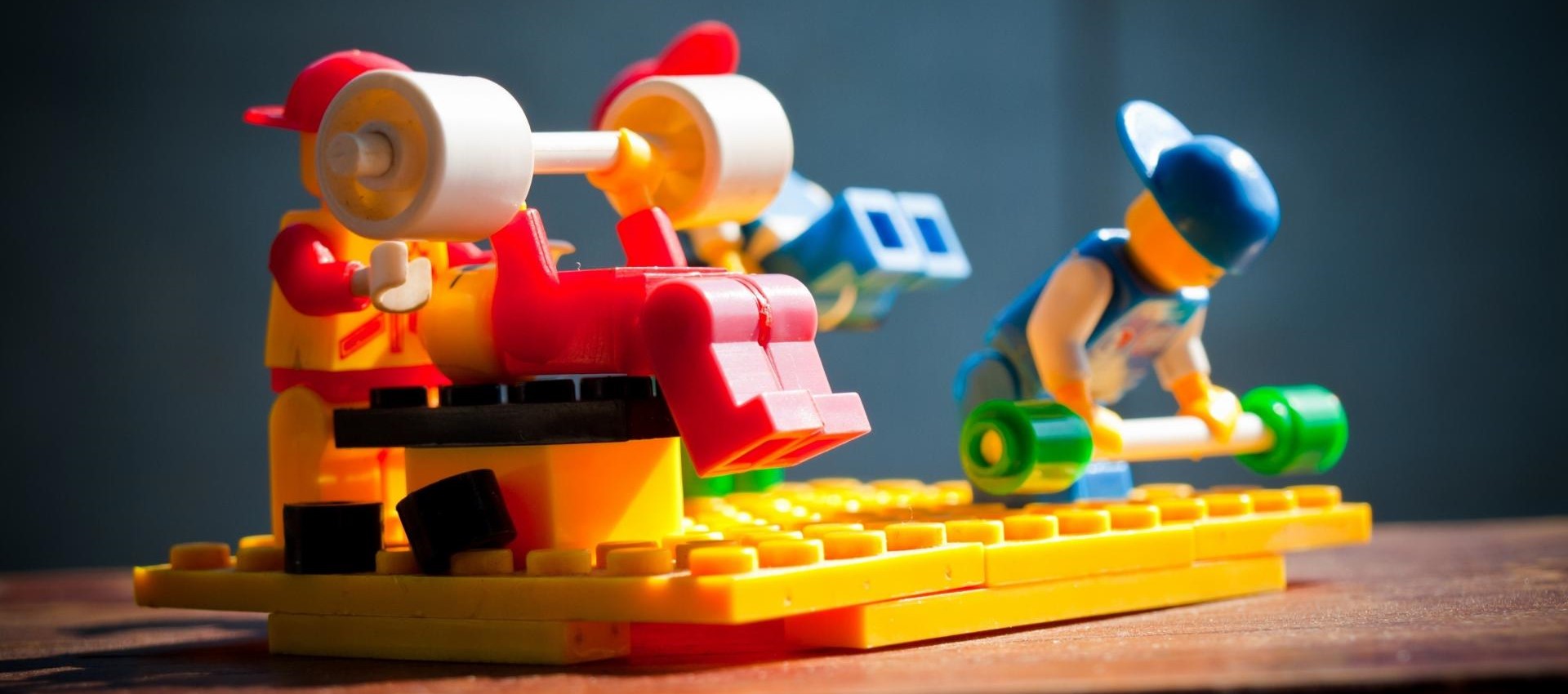
At this level, you’ll have a gym that you can start charging others to use (once it’s safe to let people in your home).
#14) Squat Rack
Any proper gym is going to have a squat rack.
It’s needed to do a barbell back squats:
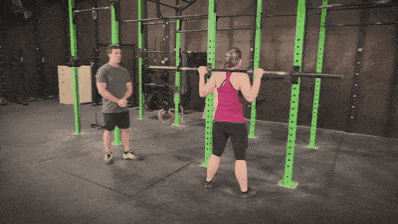
Or a front squat:
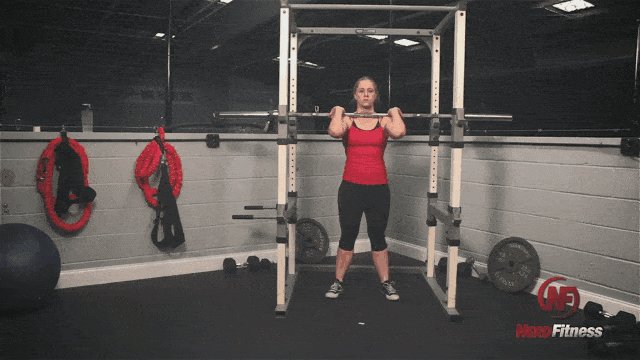
There are a couple of different options on what to buy:
- Squat Stand:
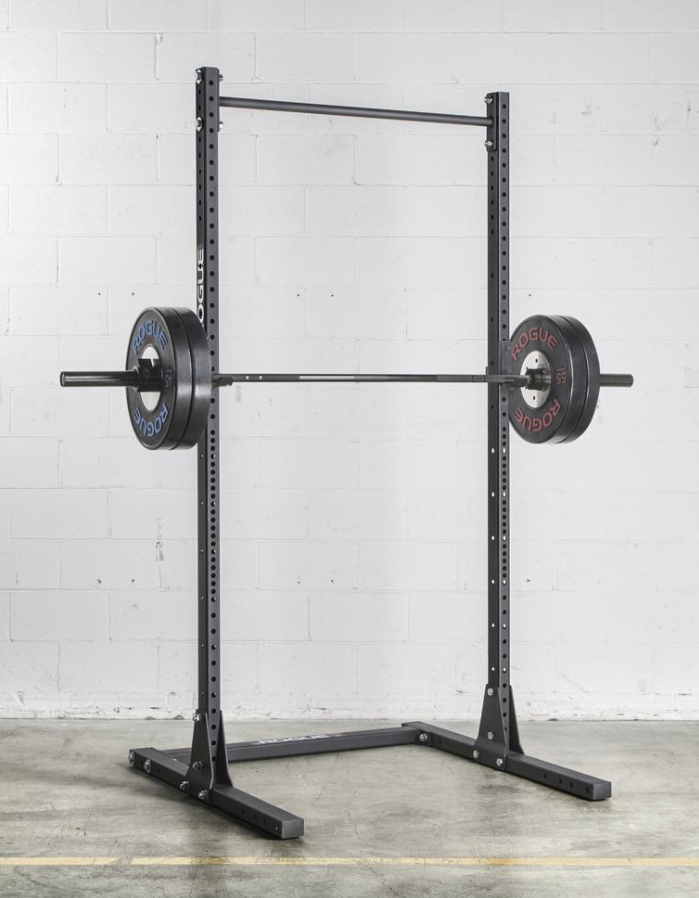
This is a good option to buy, since it also has a pull-up bar attached (nice).
- Power Cage/Squat Rack:
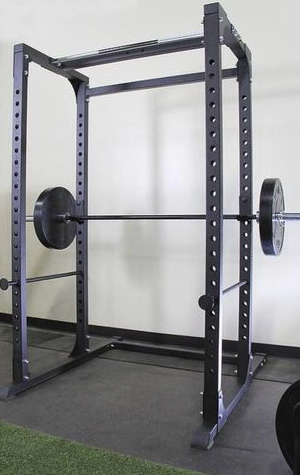
Here’s an awesome cage/rack to buy.
NOTE: THESE ARE DIFFERENT THAN A SMITH MACHINE!
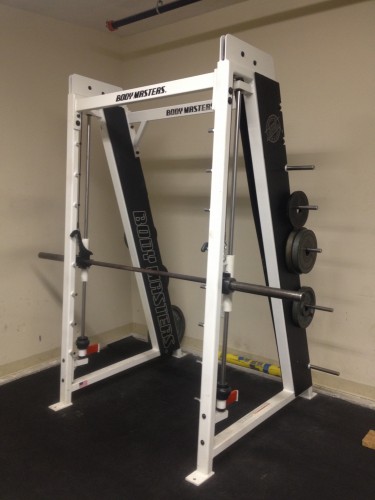
Unless you have no other choice, we want to focus on free moving barbells and stand-alone squat racks for their versatility, and we’d want to avoid Smith Machines.[3]
To learn how to use a squat rack (performing exercises properly, setting it up, etc), check out our full guide on How to Squat Properly.
#15) Barbells
To actually use a squat rack, you’re going to need a barbell (and some weights).
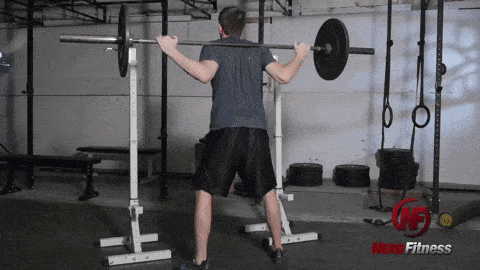
Otherwise, you’ll just start hanging clothes on it.
You’ll have two options:
- Standard Barbell – weighs 45 pounds. CAP has an awesome one you can buy.
- Training Barbell – weighs 15 pounds. Since a standard barbell may be too much f if you’re just starting your strength training journey, consider a lighter one. Fringe Sport carries a “training barbell” that only weighs 15 pounds.
You can also consider just going to home depot and buying a thin PVC pipe to start practicing the barbell movements!
Once you get used to lifting a barbell around, you’re gonna want to put some weight on it to grow strong.
#16) Weights
It’s now time to add weight to your barbell.
I’d recommend bumper plates, since they are coated in rubber and will keep you from damaging your floor and pissing off your landlord.
CAP currently has a few bumper plates that are good quality.
Also, you can go with some plain metal weights.
#17) A Bench
Outside of a squat rack, a bench will be useful for flushing out your home gym.
Otherwise, how are you going to perform a bench press?
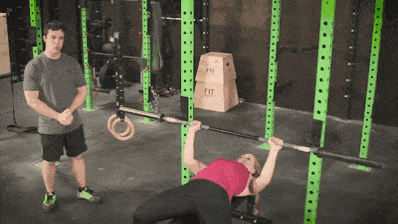
You have two options here:
- Adjustable Bench: With an adjustable bench, you can do decline and incline bench presses. This would be the way to go if you can squeeze it.
- Flat Bench: You can also go with a sturdy flat bench, which will still allow you to do presses and dumbbell rows in your home gym.
Building a Home Gym Workout (Putting It All Together)

Now that you have all this sweet home gym equipment, it’s time to put it to use.
Let’s build a workout routine!
You want a workout routine that has at least one exercise for your:
- Quads (front of your legs): do bodyweight squats or use that awesome rack you bought for barbell squats.
- Butt and hamstrings (back of your legs): you can perform deadlifts using a towel, luggage, or a barbell if you scored one.
- Chest, shoulders, and triceps: (“push” muscles): you can do push-ups right off the floor, or give those weights some action on a bench press.
- Back, biceps, and grip ( “pull” muscles): you can do rows using milk jugs, or if you’re lucky enough to grab a doorway pull-up bar, work to get your first pull-up.
- Core (abdominals and lower back): planks can be done right on your floor with zero equipment.
Before jumping into this sequence, make sure you warm-up!
It’ll help you prevent injuries. Here’s a sequence you can follow along with:
“How often should I work out, Steve?”
I generally recommend newbies complete a full-body routine (hitting every major muscle group above) two to three times a week.
On your “rest days,” you can look into doing some active recovery, yoga, or fun movement.
Now, if you’re doing a bunch of micro-workouts throughout the day, then you can get away with training every day – providing you’re giving each muscle group a chance to recover!

If you’d like to continue your journey with Nerd Fitness, I have three great options for you.
Pick the path that most aligns with your goals.
Option #1) Our online coaching program. If you want a professional coach in your pocket who will check your form, give you nutrition guidance, and adjust your workouts based on the equipment you have available, check out our 1-on-1 Online Coaching Program!
I’ve had an online coach since 2015 and it’s changed my life. You can learn more by clicking on the box below:
Option #2) If you want a roadmap for getting in shape, check out NF Journey. Our fun habit-building app will help you exercise and eat better, plus show you exactly how to train from home (with equipment or without)!
Interested?
Try your free trial right here:
Option #3) Join the Nerd Fitness Rebellion! We need good people like you in our community. And it’s free.
Sign up in the box below to enlist and get our guide, Strength Training 101: Everything You Need to Know. It’ll help you start incorporating all the exercises referenced in today’s guide.
Alright, enough from me. Your turn:
Do you have a home or garage gym?
Any “must-have” equipment that I’m missing?
What’s your strategy for hunting down “sold out” goods?
Let me know in the comments!
-Steve
PS: If you are trying to stay in shape while your gym is closed, check out:
- The 7 Best At-Home Workout Routines
- How to Stay in Shape (While Staying Inside)
- The 42 Best Bodyweight Exercises (Working Out Anywhere!)
###
Photo Source: Hotel gym, Deck workout, LEGO bench press,




